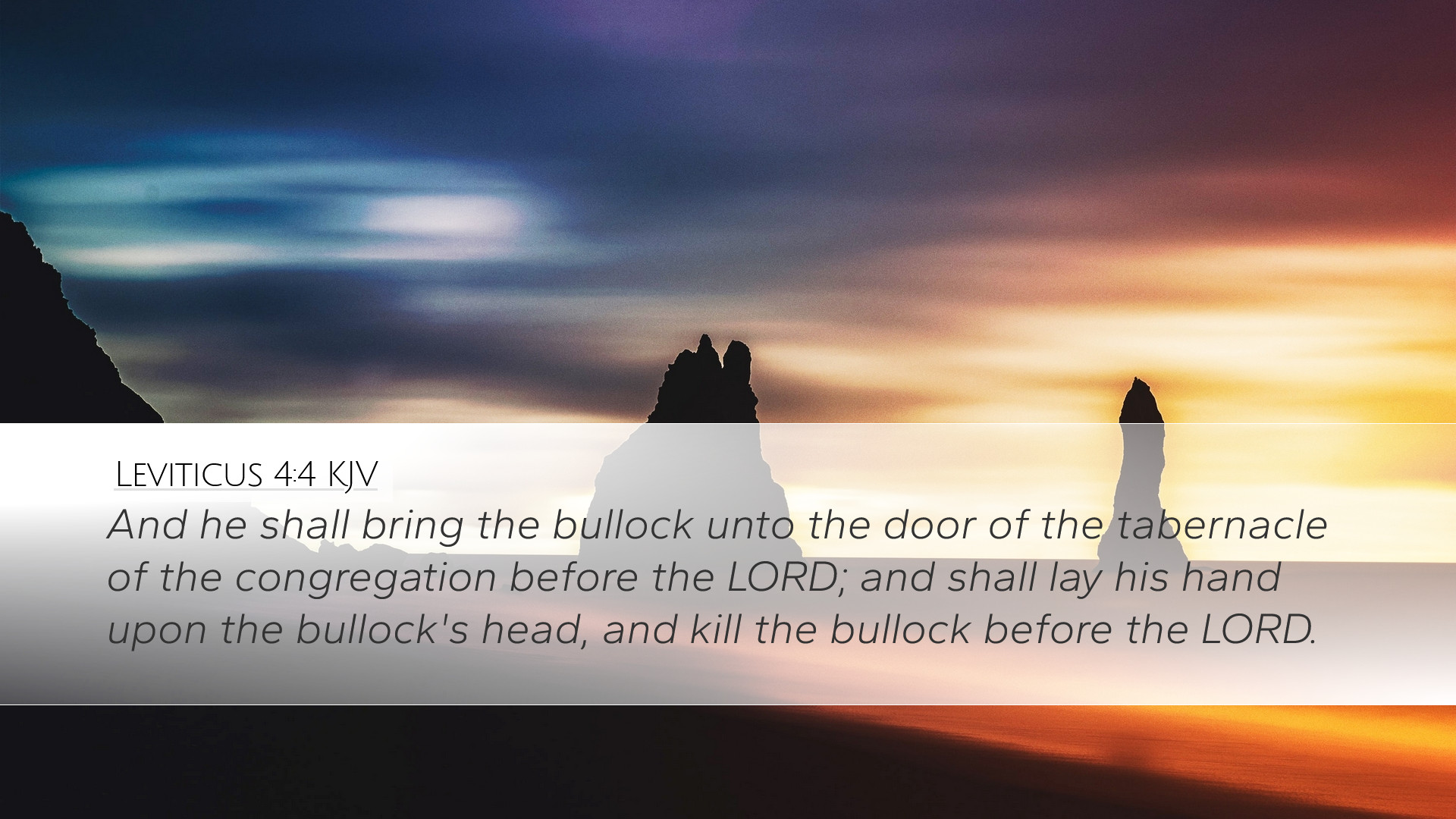Commentary on Leviticus 4:4
Leviticus 4:4 states: "And he shall bring the bullock unto the door of the tabernacle of the congregation before the LORD; and shall lay his hand upon the head of the bullock, and kill the bullock before the LORD." This verse is a crucial part of the sacrificial system delineated in the Book of Leviticus, focusing particularly on the offerings for sin.
Context and Importance of Sacrificial System
In the ancient Israelite context, sacrifices served as a means of maintaining one's relationship with God. These prescriptive rites were meticulously outlined to reflect God’s holiness and the seriousness of sin. The sacrificial act was not merely a ritual but a significant expression of repentance and an acknowledgment of the severity of transgression against God’s law.
Moral and Theological Insights
The magnitude of the sin offering illustrated in this passage encompasses several theological implications that must be understood by pastors and theologians alike:
-
The Symbolism of the Sacrifice: The bullock is a powerful symbol of Christ, representing sacrifice for sin. The act of laying hands on the animal represents the transfer of sin and guilt from the sinner to the innocent victim. This connection serves to foreshadow the ultimate sacrifice—Jesus Christ—taking upon Himself the sins of humanity.
-
Responsibility of the Sinner: The participation of the sinner in the act of sacrifice underscores the believer’s responsibility in repentance. As noted by Matthew Henry, the laying of hands signifies identification with the offering, marking a personal acknowledgment of sin and guilt.
-
Preparation for Worship: Adam Clarke emphasizes the preparatory nature of sacrifices. Before one could approach God in worship, sin must first be addressed, showcasing the necessity for atonement and purification in the life of a believer.
-
The Role of the Tabernacle: The significance of the tabernacle as the appointed place of meeting with God is profound. Bringing the offering before the LORD highlights not only the sacredness of the space but also the seriousness of approaching God—a theme echoed throughout the Old Testament.
-
God's Holiness and Justice: This scripture reflects God's desire for holiness and justice. The necessity of a blood sacrifice to atone for sin emphasizes His righteous nature, as articulated by Albert Barnes. Sin incurs a penalty, and the system of sacrifices points to a means of reconciliation, demonstrating both God’s judgment and mercy.
-
Confession and Atonement: The act of killing the bullock must be coupled with an understanding of confession. It encapsulates the reality of atonement, where the acknowledgment of sin precedes the act of sacrificial death—a precursor to the New Testament's revelation of repentance leading to grace.
-
Community and Individual Worship: This offering was both an individual and communal act. While the act was personal, it also symbolized corporate responsibility—a reflection of the community's holiness and the need for collective atonement.
-
Spiritual Implications: The act of sacrifice creates a moment of transformation for the sinner, emphasizing that true repentance demands active participation and an earnest heart. This is crucial for all believers aiming to deepen their relationship with God.
-
Christological Perspective: From a New Testament perspective, this sacrificial system affirms Jesus as the perfect Lamb of God. The shedding of blood in Leviticus heralds the necessary sacrifice that would ultimately be fulfilled in Christ, reinforcing the continuity of Scripture and God’s redemptive plan.
-
Implications for Modern Believers: For contemporary followers of Christ, this passage calls for reflection on the importance of atonement, sin confession, and the sacrificial spirit in their own lives. It serves as a reminder of God’s call to live in righteousness, maintaining a posture of humility before Him.
Conclusion
Leviticus 4:4 offers a rich tapestry of theological significance that is applicable for today’s Christians. The process of sin offering, encapsulated in this verse, paves the way for understanding the depths of grace and sacrifice. Pastors, students, and scholars can draw from this verse the vital connection between the Old and New Testament, the weight of sin requiring atonement, and the beautiful hope found in Christ’s sacrifice.


